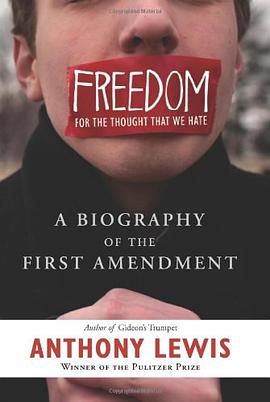Freedom for the Thought That We Hate
内容简介
Book Description
From one of the country's most esteemed experts on the First Amendment and the author of the classic Gideon's Trumpet, an eloquent essay on the importance of freedom of expression.
More than any other people on earth, Americans are free to say and write what they think. The media can air the secrets of the White House, the boardroom, or the bedroom with little fear of punishment or penalty. The reason for this extraordinary freedom is not a superior culture of tolerance, but just fourteen words in our most fundamental legal document: the free expression clauses of the First Amendment to the Constitution.
In Lewis's telling, the story of how the right of free expression evolved along with our nation makes a compelling case for the adaptability of our constitution. Although Americans have gleefully and sometimes outrageously exercised their right to free speech since before the nation's founding, the Supreme Court did not begin to recognize this right until 1919. Freedom of speech and the press as we know it today is surprisingly recent. Anthony Lewis tells us how these rights were created, revealing a story of hard choices, heroic (and some less heroic) judges, and fascinating and eccentric defendants who forced the legal system to come face-to-face with one of America's great founding ideas.
......(更多)
作者简介
About the Author
Two-time Pulitzer Prize winner Anthony Lewis was a columnist for the New York Times op-ed page from 1969 through 2001. Since 1983, Lewis has been the James Madison Visiting Professor at Columbia University. His previous three books are Gideon's Trumpet, which has sold nearly a million copies in over forty years in print; Portrait of a Decade; and Make No Law: The Sullivan Case and the First Amendment. He lives in Cambridge, Massachusetts.
......(更多)
目录
......(更多)
读书文摘
麦迪逊在给副总统杰斐逊的一封信中写道:“国内自由的丧失,被归咎于为了防范来自国外的威胁——不管这种威胁究竟是真是假,这种情况可能会普遍存在。”
......(更多)






